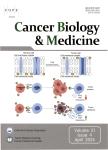Prognostic model of survival outcomes in non-small cell lung cancer patients initiated on afatinib: pooled analysis of clinical trial data
Prognostic model of survival outcomes in non-small cell lung cancer patients initiated on afatinib: pooled analysis of clinical trial data作者机构:Flinders Centre for Innovation in Cancer Department of Clinical Pharmacology College of Medicine and Public Health Flinders University Adelaide 5042 Australia The Canberra Hospital Garran 2605 Australia
出 版 物:《Cancer Biology & Medicine》 (癌症生物学与医学(英文版))
年 卷 期:2019年第16卷第2期
页 面:341-349页
核心收录:
基 金:supported by a grant from Cancer Council South Australia’s Beat Cancer Project on behalf of its donors and the State Government through the Department of Health (Grant No.1159924 and 1127220) funded by a Postdoctoral Fellowship from the National Breast Cancer Foundation, Australia (Grant No.PF-17-007)
主 题:Afatinib non-small cell lung cancer prognostic model
摘 要:Objective: Several predictors of survival have been identified in EGFR-positive non-small cell lung cancer(NSCLC) patients treated with first generation EGFR inhibitors. Prognostic models of survival outcomes with afatinib have not been evaluated.Methods: A prognostic tool for overall survival(OS)/progression free survival(PFS) based on pre-treatment clinicopathological factors was developed for EGFR-positive advanced NSCLC patients treated with first-line afatinib using penalised regression of individual-participant data from LUX-Lung 3 and 6(n = 468). Favourable, intermediate and poor risk groups were identified and externally validated using LUX-Lung 1(n = 390) and LUX-Lung 2(n = 129) trials that initiated afatinib following previous chemotherapy or EGFR inhibitor treatment.Results: Discriminative performance was good in the development and validation cohorts. For patients treated with first-line afatinib, the median OS for the favourable, intermediate and poor risk groups were 47.7, 29.3 and 16.4 months, respectively, and the median PFS were 17.3, 13.2 and 8.3 months, respectively. The improvement in median OS with afatinib use compared to chemotherapy was 12.4 months for the favourable risk group, whereas no OS benefit was apparent for the poor risk group. The improvement in median PFS with afatinib use compared to chemotherapy was 10.2 months for the favourable risk group and 3.2 months for the poor risk group.Conclusions: A prognostic tool was developed and validated to identify favourable, intermediate and poor risk groups for OS/PFS in EGFR-positive advanced NSCLC patients treated with afatinib. The prognostic groups can inform the likely absolute OS/PFS benefit expected from afatinib compared to chemotherapy in first-line treatment.



